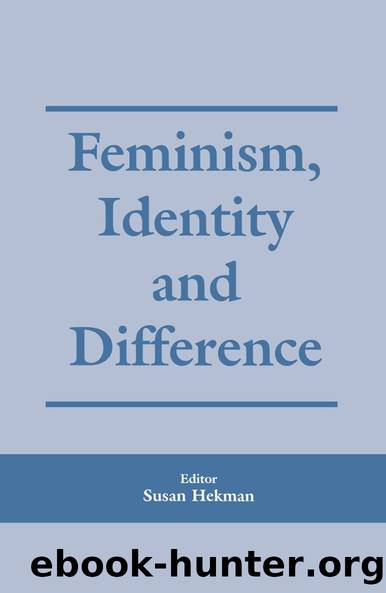Feminism, Identity and Difference by Susan J. Hekman

Author:Susan J. Hekman [Hekman, Susan J.]
Language: eng
Format: epub
ISBN: 9780714680743
Barnesnoble:
Publisher: Taylor & Francis
Published: 1999-09-30T00:00:00+00:00
Labouring Citizens
American citizenship is no longer measured simply by the republican criteria of bearing arms, voting, and concern for public honour. The social standing central to citizenship is found before the law and in politics, to be sure, but more importantly it is to be found in âthe marketplace, in production and commerce, in the world of work in all its forms, and in voluntary associationsâ (Shklar, 1991, p.63). Here is where a citizen finds âhis social place, his standing, the approbation of his fellows, and possibly some of his self-respectâ (Shklar, 1991, p.63). In this context, not working amounts to the loss of public presence as well as approval. Those who do not work cannot be independent, and if they are not independent, they are not only less than equal, they are a drain on those who work. In contemporary American society, the threat of luxury and corruption so central to republican rhetoric bears the faces of welfare mothers, slackers, and immigrants (as well as sexual minorities, for reasons we will see shortly).
The peculiar importance of work, Shklar argues, arises from the centrality of the contrast between free and slave in US history. The âAmerican work ethicâ she describes as âthe ideology of citizens caught between racist slavery and aristocratic pretensionsâ, an ideology that has endured because the political conditions to which it responded from the first have not disappearedâ (Shklar, 1991, p.64). The phallic binary of agent/slave may have its roots in this unique situation. The stark division between free and slave has always been a resonant and overused part of American political language.
The fetishisation of labour has perpetuated the myth of phallic agency. The labouring body endures; it is disciplined; it is productive. In the USA, the labouring body is the citizen body. Bodies that fail identification with the labouring body must be suspect as citizen bodies. Not all citizen bodies labour, of course, but the citizen ideal in the USA labours in the market. The individual who is cared for by others (whether by family members or the state) is not considered a worker, and thus does not present herself as a citizen (Fraser and Gordon, 1994; Pateman, 1989, pp.179â209; Young, 1997, Ch.6). Her body is not seen as a labouring body, because its labour is invisible to the market. Womenâs campaigns for access to work relied on this point, treating work as the precondition of effective citizenship. This ideal of labour has limited the progress of social rights in the USA. Not only are women who do not earn treated as less than equal, their homes and bodies open for state inspection, men who fail to produce are often denied even the minimal welfare allotted to women and children. The ideology of phallic masculinity mandates that any man worth his citizenship be a worker. The absence of welfare, training programmes, and other social support for single men signals a widespread willingness to deny acknowledgement to those who do not act like âreal menâ.
The ideology of
Download
This site does not store any files on its server. We only index and link to content provided by other sites. Please contact the content providers to delete copyright contents if any and email us, we'll remove relevant links or contents immediately.
Chaco's Northern Prodigies : Salmon, Aztec, and the Ascendancy of the Middle San Juan Region after AD 1100 by Paul F. Reed(367)
Digital International Relations by Unknown(366)
Law Enforcement Interpersonal Communication and Conflict Management by Brian Douglas Fitch(359)
Skilled interpersonal communication: Research, theory and practice, Fifth edition by Owen Hargie(341)
The Enduring Color Line in U.S. Athletics by Krystal Beamon Chris M. Messer(340)
Critical Perspectives on Human Security : Rethinking Emancipation and Power in International Relations by David Chandler; Nik Hynek(336)
EPSO CAST Political affairs EU policies: How to succeed in the selection procedure by Franco Reverte José María(313)
Evidence-Based Policy Making in Labor Economics by Hamermesh Daniel S.;Nottmeyer Olga K.;Nottmeyer Olga;King Sarah;King Sarah;King Sarah;(309)
Writing Public Policy - A Practical Guide to Communicating in the Policy Making Process by Catherine F. Smith(292)
Criminological Theory in Context by John Martyn Chamberlain(286)
Tibeton Yoga Its Secret Doc by Evans-Wentz(280)
Rothschild and Early Jewish Colonization in Palestine (Geographical Perspectives on the Human Past) by Ran Aaronsohn(280)
Threshold Concepts in Women's and Gender Studies by Christie Launius Holly Hassel(273)
Social Problems, Social Issues, Social Science by James Wright(272)
Positive Psychology and Spirituality in Counselling and Psychotherapy (Conflict, Ethics, and Spirituality, 12) by unknow(270)
Play in child development and psychotherapy: toward empirically supported practice by Sandra W. Russ(269)
Cognitive Development in Infancy and Childhood (Elements in Child Development) by Mary Gauvain(269)
Latin American Politics and Society by Gerardo L. Munck & Juan Pablo Luna(238)
What Makes a Social Crisis?: The Societalization of Social Problems by Jeffrey C. Alexander(227)
